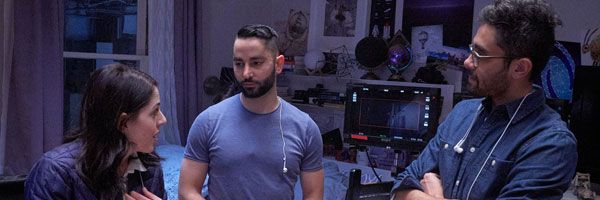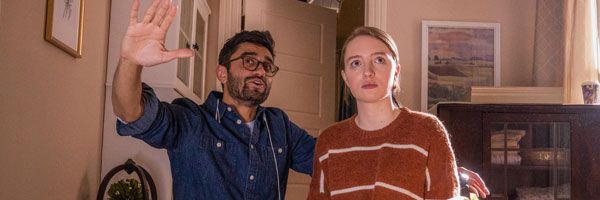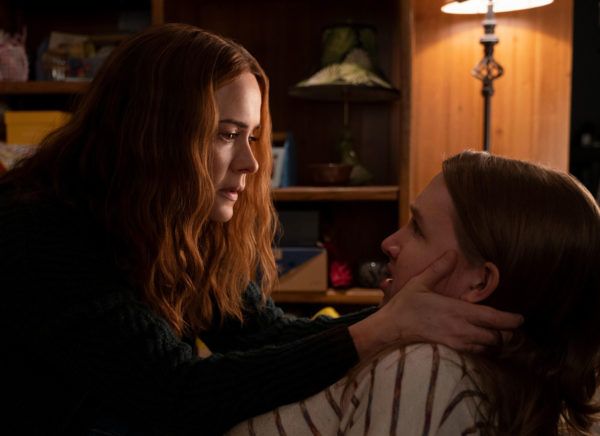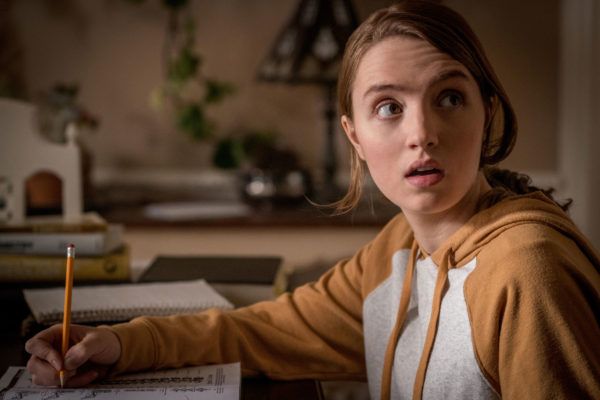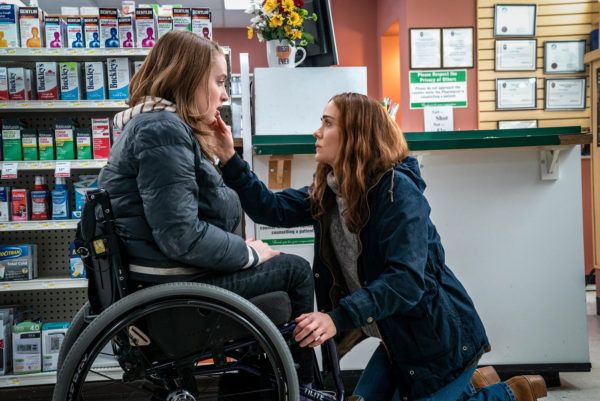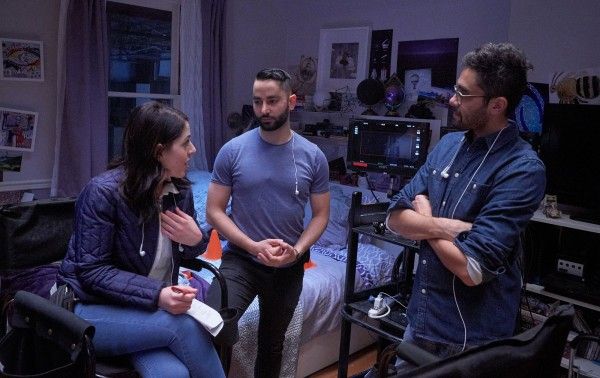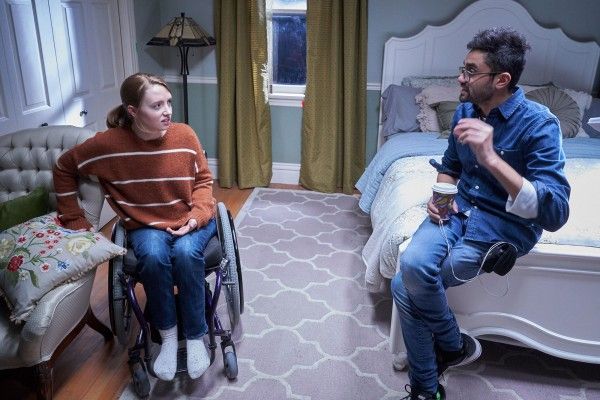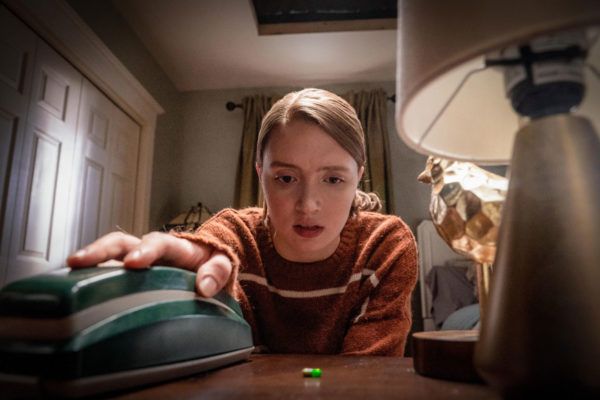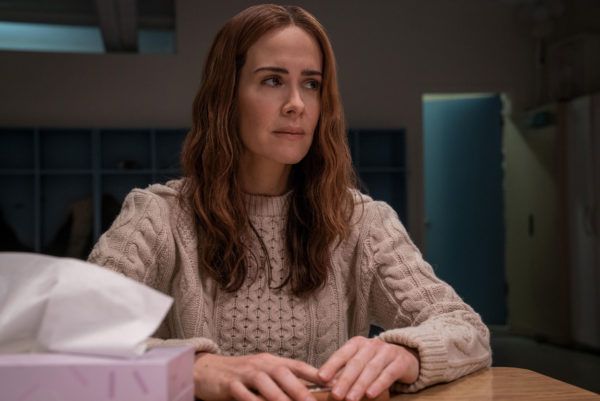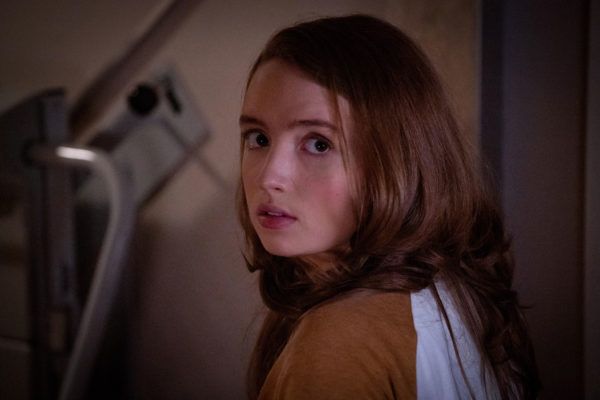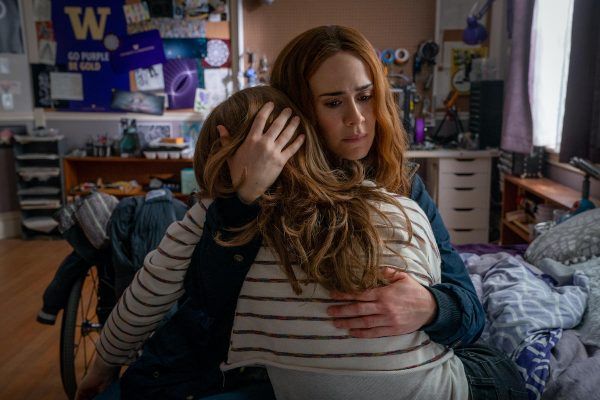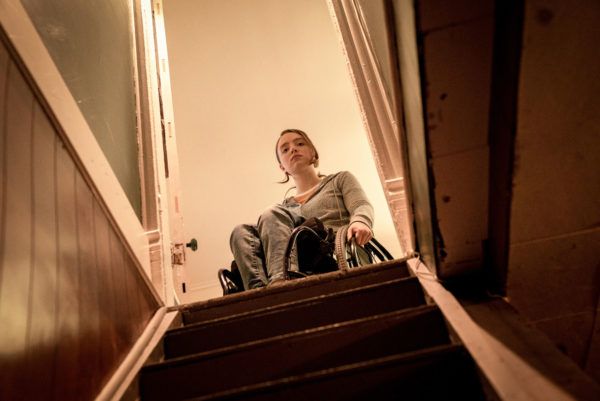You know how the industry tends to works, right? If your first feature is a hit, you better be prepared and hold on tight because everything could change in flash, and that’s exactly what happened for Searching director Aneesh Chaganty. That movie utilizes the “screenlife” technique extremely effectively, won the Alfred P. Sloan Feature Film Prize at Sundance 2018, become a critical hit and, to top it all off, scored over $70 million at the worldwide box office on a reported $880,000 production budget. It’s a certified hit so it came as no surprise when news broke that Chaganty and his team were moving on to their next feature, Run, so soon after Searching’s release.
Run stars newcomer Kiera Allen as Chloe, a teenager who spends her days home sweet home with her mother, Diane (Sarah Paulson). Ever since Chloe was born, she’s been raised in isolation with Diane controlling every single move she makes. Is it just a mother’s love or is there something more sinister lurking beneath? Chloe starts wondering about just that after making certain discoveries.
Back in November 2018, I got the opportunity to visit the Winnipeg-based set of Run to learn a little more about the film. We shared my chat with Allen about her first big feature experience, and now it’s time to shift the focus over to Chaganty who admits that Run kind of felt like he was making a first feature again. What was it like making the transition from screenlife to a more traditional filming process? Read all about that and loads more in our full on-set conversation below.
Can you run me through the scene you were just shooting?
ANEESH CHAGANTY: We were just blocking a pretty emotional scene that happens very, very early on in the film. To give you some context, that is gonna sound like no context at all [laughs], our film Run is about this home-schooled teenage daughter, or we call her “daughter” in the script, who kind of just starts to discover a little tiny thing that's off about this household that she lives in. And the household she lives in is just her and her mom. And this little tiny thing kind of leads her on a path of discovery to what we think is a pretty sinister secret. And what we were blocking downstairs is an early scene that happens in the film where she starts to piece together what that secret is. She has no idea what it is, but she thinks she does, and it sort of leads to a very emotional interaction between mom and daughter sort of reinforcing how tight they are as a family and as a unit.
Before Daughter starts to realize something weird is happening, what type of mother is Mother?
CHAGANTY: An awesome one. I mean, she is 100% the most loving mother in the world, you know? And no matter how you look at it, before and after things kind of get realized, it's just this woman cares for her daughter. She home schools her. She brings her groceries. She cleans her clothes. From the beginning, ever since her daughter was born, she's been really sick her whole life. She's had heart problems, lung problems, liver problems, iron poisoning. She has a range of issues on top of which she is paralyzed and uses a wheelchair for the entirety of the film. So this mom is basically her caretaker, her cheerleader, her teacher, her coach, her everything, and we’ll come to love her just as much as our daughter does.
Can you tell me about finding Keira? I just had the pleasure of sitting down with her …
CHAGANTY: Yeah, she's cool, right?
She seems incredible! What was it about her audition that made you think, ‘That is my Daughter?’ That sounds weird.
CHAGANTY: She was great. [Laughs] Yeah, that's my Daughter! Honestly, she was just the best of the pack. I don't know how else to look at it. I think she is super, super vulnerable, very very - actually, extremely intelligent, has the emotional maturity of somebody who I think to be significantly older than the age she actually is, which allows her to process a lot of the scenes that are happening in the movie. And a lot of the scenes are super complex and deep, kind of emotionally resonant scenes and she has such a strong grasp of it. And you can see it on set. The questions that I get from her are so like, ‘Wow, yeah, great question. Let me think about that for a second.’
Watching you guys downstairs, even just for a short while, you seem like a very collaborative director, whether you're talking about something with your actors or Natalie. And I imagine it’s a similar thing with Sev, too. Are you guys constantly hashing out everything as it's happening as a team like that?
CHAGANTY: It's only really because you're around. [Laughs] I'm a complete dictator when I'm - no. Yeah, I mean, we call ourselves the triangle - Sev, Natalie and I. That’s sort of what our group chain is, and a possible title for our production company. Who knows? But, it's the three of us kind of having a really, really strong checks and balances system. I think one of the things that I've observed is, I always think that any project is as good as the unit behind it and whenever there's one person behind it or something, it has a higher capacity to fall apart because that one person can get affected by these outside forces that don't have him or her in check. And for me, my checks and balances are Sev and Nat. And for Sev, his checks and balances are me and Nat. And Nat, Sev and myself. So, we all kind of really dip our toes in each other's business in a lot of ways. I'll comment on producing. They'll comment on directing, Nat will comment on writing in a way that I think is super collaborative. And the movie that comes out being made is not my movie or his movie or her movie; it's our movie, and I’m very, very proud to be a part of that group.
It’s cool to hear about a working relationship like that. What about with Keira and Sarah? Again, just listening to Sarah on set for a couple of minutes, she seems like she's the kind of person who pays attention to every single detail.
CHAGANTY: If I had to give a perfect analogy to what working with Sarah has been like, it's sort of been like, I'll just point and say, ‘Hey, here's where you turn the ignition on. Here are the keys. That's the gas. That's the brake. Go.’ You know? It's funny because Keira and Sarah are like complete opposite ends of the spectrum in the sense that Sarah's coming in, she's an extremely veteran actress. It's so hard sometimes for me to give her a note because I'm like, ‘Yeah, you got it. Take one. You got it. Good.’ [Laughs] And with Keira, it’s like I'll give her a little bit more notes and kind of shape her performance and it'll end up being amazing, but with Sarah oftentimes, it's just listening to what she has to offer and what she thinks and then me being like, ‘Yup, you're right. You're 100% right,’ and then going with that and what ends up coming out is such a solid, solid and true beat or sequence or whatever we're doing.
The way I've worked with Keira is so different than the way I've worked with Sarah. For Sarah's character, I wrote a 15 or 16 page, 10-point font backstory that was started with her mom's mom and took her down to the moment of this movie, and it's all so specific because again, this movie's about a lot of secrets being discovered and what exactly led every one of these characters to the point they are at the beginning of the story. And for me, so much of my homework with Sarah was just that, was like giving her that, talking her through that and she's now able to process everything on her own and spit out what I think is just pure fire. On Keira's end, I'll meet with her on off days. I'll have these rehearsals with her. I'll go over every single line with her. I'll talk to her about it. She'll kind of perform, or ask questions. We'll go over every single beat. I'll ask her, like, ‘That thing in your room? When'd you get it? When's the last time you used it? Why is it there? What's that for? Why do you treat it the way that you treat it? Do you like that thing?’ Just ask her a thousand questions so she knows everything and is able to process it. So it’s like a totally different way of working with two very very talented people. One of whom has a ton of experience and one of whom is about to get a ton of experience.
What is it about these family stories that appeal to you?
CHAGANTY: Yeah, I don't know what it is about families, but Sev and I because we write together, just always gravitate toward these very, very family-based stories. Our third movie is also a very family-based story, though it's a different genre. But I think it just kind of comes from this - I think our backgrounds. Both of us kind of came from very, very tight-knit families. Natalie did too, so she kind of falls right into that triangle piece that we're talking about. I don't know what it is, but it just comes out naturally. It ends up being what we write about because it's true to us. And the more that we do it, I realize the less that this is a theme that's done in mainstream cinema. It's just not a thing that people talk about. Not on purpose, but just it doesn't happen and it's just very, very true to us.
Can you give me a sense of the timeline with Run? I was watching some old interviews you did for Searching at Sundance and at the time, you mentioned having another project lined up that sounded a lot like this. So even before the big hit at Sundance, you had this?
CHAGANTY: Yeah, we had this. We started writing this thing while we were editing Searching. We came up with the idea for the way that we were gonna tackle this particular story really right in the middle of Searching. And Searching took such a long time to edit, just to make one single cut would take 10 minutes at a time, that we would go off, and we'd start working on a beat sheet. And that beat sheet became an outline. Right when we finished the outline is when we finished Searching, and I took a two month trip to go to Southeast Asia and find myself and backpack and stuff. Not really find myself. Just backpack. [Laughs] We came back and when I got to Sundance, we had written half of Run. We got to the midpoint, and right after Sundance it was like, ‘Okay, we gotta finish this now.’ So we got back to work and spent another five months on it, but we had worked a total, I think, about almost two years, a year and a half to two years just on the screenplay and the story starting with the editing process of Searching. And I have no doubt that we'll be working on our third movie while we're editing Run.
Is there anything about Searching that kind of sparked the beginning nugget of an idea for this movie?
CHAGANTY: It grew out of the massive amounts of time we had between takes. It grew out of just being like, ‘What do we do? Let's go to our ideas list,’ and checking out that and then reading things online and kind of piecing together what we felt like was a story. But there's no - actually, no. The one thing that I'll say, I gravitated towards this idea and that's purely because of Searching, was I felt like at Searching, just really speaking as a director, that film is so technically complex and wears its style and its storytelling method on its sleeve so much that I wanted to prove to myself and maybe to an audience that I could do the opposite. I could remove all of the layers of complexity and just put a camera in one place, in one house and tell a story and have you gripped just as much. And that, to me, is my personal challenge. We'll see in a few months if I pulled it off. But, the objective here was to take all of the trappings away and hopefully still tell a story that doesn't need to wear it's style on it's sleeve to be heart-pounding, emotional and kind of nail-biting suspenseful.
What is the new style here? Are there any visual references you're working with?
CHAGANTY: Yep. It's [Alfred] Hitchcock and [M. Night] Shyamalan. It's a pure Hitchcock and Shyamalan movie. The tightness of the shots, the rarity that we cut, what happens in a single frame, how designed every frame is. It’s literally - I mean, it’s ripped off from Hitchcock and Shyamalan.
Any specific movies you can reference?
CHAGANTY: Yeah. I do a lot from Psycho. I do a lot from Rear Window. Both of those films particularly. And then from Shyamalan's side, I do a lot from Unbreakable. A lot from Signs. Those are probably the four most commonly visual thefts that I do.
So we've got the logline …
CHAGANTY: [Laughs] The vague hints of what it's about.
Very vague! We know this is gonna be a thriller, but what do you want people to take away from this experience, so it's not just a fleeting thrill and means something?
CHAGANTY: You know, when we were making Searching, it was about a parent's love for a child and how far that extends and the warm and gooey and fuzzy feeling that that love gives. Run is exactly about that. It's about how far a parent will go for their child, how much they can love them. We just wanna look at the opposite, darker side of that and if I can give a spoiler away, we just wanna look at the darker side of what pure love looks like. Can you love someone so much that it starts to be a bad thing?
Very out of left field question, but because we were talking about it earlier, the picture downstairs in the hallway with the animals that are very well dressed, is that there for a reason?
CHAGANTY: Everything in this movie is there for a reason. I don't wanna tell you what they are. I mean, there's no scene in our film where people wear animal heads; I'll give you that spoiler. But, there is a reason that everything in this house is here.
Can you tell me about the process of casting Sarah, especially coming off of Searching? You have a script, Searching takes off at Sundance, are you then given the opportunity to make a realistic dream list and go out to people?
CHAGANTY: Everything that has happened in my life in the last seven months has been the craziest thing. There's no element of me being like, ‘Oh, now I have the [opportunity] …’ It's just like, ‘Oh my god, Sarah Paulson's interested? Go! Go! Just get her in here!’ With Searching we wrote it for John [Cho]. With Run, we wrote Mother just to be a super, super compelling character and never would I have suspected that someone of Sarah's caliber is gonna be in this movie. When they said she was interested and that she wanted to meet, I was just like, ‘Oh my god, we haven't shot a frame, but our movie just got ten times better.’ And I'm happy to say, we got at least 11 times better watching her kind of do everything on the day.
It's crazy when you break down the timeframe. It's only been seven months and probably everything in your life has changed.
CHAGANTY: Yeah. It's weird. I still feel like, ‘What am I doing here?’ This is technically my second movie, but in a lot of ways it's my first, too. I've never made a live-action movie, you know? But I've studied them. I know what I wanna do and everything like that. So in a lot of ways, this is my first time - I feel like I'm getting a first time again, and the fun and the instinct that kind of brings out is really, really exciting. But don't tell Sarah that. [Laughs] I'm really glad to be here. It's been a hell of a year.
But I did hear that some of the style in Searching and maybe that shooting technique does come into play here a little bit …
CHAGANTY: Someone said that? Okay, yeah I think with Searching, what the big lesson for me as a filmmaker was out of that is that tech plays such a huge role in all of our lives that there's no point in cutting away from it to explain it. I think you can use that style that we found in Searching and allow it to match the tone and the style and the genre of whatever story that you're telling. There's a couple moments here where tech plays a role, and that may or may not be something that we do in a much more limited capacity. Run is not a film that takes place on screens, thank god.
Can you explain the title Run? Why did you go with that?
CHAGANTY: People keep joking that when we first came up with Run, everyone's like, ‘They're gonna change it to Running.’
[Laughs] Can you, please?
CHAGANTY: No, we're not changing it to Running! [Laughs] Can I give an answer? That’s a hard no, that’s a hard no. It's called Run for a very specific reason that I can't give yet. [Laughs]
How has it been doing traditional camera set-ups here? Is that freeing or is there any part of it that makes you think, ‘Oh no, I didn't realize how that was done, and now it's a different challenge for me?’
CHAGANTY: Both. I've made a career out of doing unconventional stuff. I worked at Google. I was telling stories through tech. I feel like I got so able at being able to tell stories in weird ways that there's definitely a bit of like, ‘Oh, okay. We're now doing this thing that everybody does. How do I set this film apart from everything else here?’ And that fear and that kind of awkwardness has definitely manifested itself, especially in the early days, but I'm just as good as the people around me and the people around me are pretty fucking great.
What about getting all the coverage you know you're gonna need for the edit? Earlier Natalie brought up the importance of inserts. Are you overshooting the details just in case?
CHAGANTY: No, I've storyboarded every single frame of this movie by hand. Basically, three and a half months ago, I started storyboarding. I know basically how the whole film's gonna be edited, but every single shot, I have like 100 pages of every frame of the movie and that gets sent out to the entire crew the night before, everybody. But all the departments heads have had that for a while. And it's basically how we're gonna shoot every shot. It's how Shyamalan operated, it’s how Hitchcock operated, just sort of making sure that every single shot has multiple layers of meaning. So in that way, I feel like I've come very, very prepared because I know exactly what I need and when we don't get it, we have to go get it. It's not something that like, ‘Oh, I wish we had …’ It's like, ‘We need that piece to tell a story,’ because every single shot in this movie is important. Like, every one. And if we missed one, we'd be missing a beat in the story.
I must ask, why Winnipeg? Because it's freezing here.
CHAGANTY: The story takes place in Washington, the state of Washington, and Winnipeg has really good tax credits. You know, that’s the honest answer is we get the most bang for our buck here. Do I wish it was less snowy, warmer and not absolutely frigid when you go outside? 100%. But what I've been realizing is, you don't make a movie because of things; you make a movie despite things, and our despite is the weather.
I was hearing about the snow and how that changed some of your plans. Can you talk a little bit about that?
CHAGANTY: We've had to adjust a lot here. It's just sort of being a little creative with the frames. It's being creative with the lines, writing alt lines that address things and it's just kind of forced us to be much more creative. Again, it's not a position that we wish we were in, but we're gonna make it work and I think at the end of the day, every bit of stress and worry that we have, no one's gonna notice it at the end of the day once it all comes together. But it's been a lot of creative thinking and solutions.
I think you have to get going, but I don’t want to wrap this without asking you about the decision to cast someone who uses a wheelchair in real life as Daughter.
CHAGANTY: I'm very, very proud of the fact that we're able to get Keira on here. I mean, first and foremost, she's an incredible actress. You know, we had a fight on Searching, which was trying to cast an Asian-American family and not address it, and we won that. And we knew that every film we make, I think we should be fighting for something that is beyond the movie. For us it was, we wrote a character that uses a wheelchair and was born in a wheelchair and her whole worldview and perspective is defined by the fact that she uses a wheelchair. We should hire somebody who uses a wheelchair in real life. Just like our casting search in Searching, it was made more difficult because every added filter that you put on a search limits the amount of people that you're looking at. But we knew that person was out there. It's just a matter of how. We had an incredible casting agent, but we were looking through drama programs, after school programs, acting schools, theater programs, friends of friends were sharing the word online. People were just trying to get the word out to anybody that they know who kind of has a disability or uses a wheelchair in real life who wanted to be an actor because we knew that they were out there and through that process Keira emerged. No matter what people think of the movie, and I think they're gonna like it, but even if they don't, it's nice to know that in a lot of ways we won already.
That makes me think about something we talk about a little too often. Whether it’s a female director, an underrepresented race, sexual orientation, etc., we often hear something along the lines of, ‘An extensive search was done, but we didn’t find anyone so this is where we landed.’ Do you think that other productions, filmmakers and producers just need to put in the legwork like you did?
CHAGANTY: It’s a complicated question because there's a lot of factors that come into it, you know? A casting search costs money. Whenever you're trying to put forward a philosophy or a fight for something that you believe is right, that's oftentimes not the cheapest decision to do. These searches have to extend longer periods of time, have to go further distances. That all is money that you're spending and it's that balance that you have to find. Yes, is anything possible? Yes. Can you cast somebody if you look hard enough and use enough resources? Absolutely. But it's also just as valid for somebody to say, ‘We don't have the resources.’ And I think I'm just very, very grateful that Lionsgate was willing to extend those resources for what we all believe is a very, very good reason to fight for.

